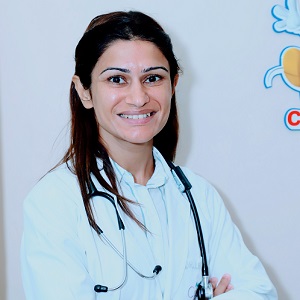General pediatrics is the branch of medical research focusing on infants, children, and young adults' mental, physical, and social well-being. It begins with newborns and continues until young adulthood. General pediatric care involves a wide range of health services, from preventative care to the evaluation and treatment of chronic and acute conditions, such as the common cold and flu. In addition, it provides complete clinical care and consultations for newborns, children, and adolescents with chronic and acute breathing issues.
About the Procedure
From birth to age 18, general pediatricians assist infants, kids, and adolescents. Pediatricians can treat common cold symptoms, watch for patterns that may necessitate more assessments, and offer preventive drugs, vaccinations, and routine testing. In addition, they collaborate with other professionals to ensure the best possible care for the kids and refer them when necessary.
A pediatrician is a medical specialist specializing in diagnosing, treating, and preventing diseases in children. They are also advocates for the rights of children in the public sphere.
Who Qualifies for the Procedure?
Pediatricians are required to complete a comprehensive educational and training process. They must first earn a four-year bachelor's degree. During their time as undergraduates, individuals prepare for careers in the medical field by taking subjects like biology and chemistry.
Pediatricians must then attend medical school for four years. They study subjects like anatomy and physiology in medical school. They also learn about medicine through clinical rotations.
Why is the Procedure Conducted?
The goals of general pediatrics research include lowering baby and child mortality rates; halting the spread of infectious illnesses, promoting healthy lifestyles so that people live long and healthy lives; and assisting children and adolescents with chronic health issues.
General pediatricians (GPeds) provide complete health care, including routine procedures' safe and successful performance. This study aimed to identify why GPeds consider learning procedures important, what challenges prevent them from gaining and keeping procedural skills, and which procedures they think are included in the training.
Different Types
Pediatric surgeons include:
- Pediatric neurosurgeons: Pediatric neurosurgeons treat things like hydrocephalus, shunts, brain tumours, congenital disabilities of the brain, spine and spinal cord problems, lumps and bumps on the skull, and spinal cord tumours combined with spasticity.
- Pediatric ophthalmologists: Pediatric ophthalmologists treat disorders such as lazy eyes, vision problems, tear duct illnesses, developmental anomalies, and ocular cancers.
- Pediatric orthopedic specialists – Pediatric orthopedic surgeons treat scoliosis, hip pathologies, growth deformities, cerebral palsy-related bone and muscle difficulties, and traumatic injuries.
- Specialists in pediatric otolaryngology (ENT specialists): Otolaryngologists specialize in the medical and surgical treatment of a range of diseases that affect the ear, nose, throat, skull base, head, and neck.
- Pediatric plastic surgeons: Pediatric plastic surgeons treat congenital deformities, like cleft lip, and traumatic and post-oncologic deformities in children.
- Pediatric urologists: Pediatric urologists diagnose and treat conditions that affect children's genitourinary disorders.
Benefits
The field of pediatrics plays a crucial role in ensuring the health and well-being of children. Pediatrics primarily focuses on health concerns like children's common colds and flu. Practitioners research the best ways to help young patients live good lives.
- Promoting professional development and providing an inclusive environment attracts and keeps talented faculty and professionals.
- Medical education and mentoring for the new generations of pediatric professionals
- Leveraging our faculty's experience to engage in breakthrough scientific discovery and apply newly discovered knowledge to pediatric care and public health.
- Collaboratively intervening on policies and other factors that impact socioeconomic determinants of health in collaboration with communities.
The following are some of the specialities:
- Renowned pediatricians provide complete health checkups
- Complete Vaccination Services
- Keeping an eye on growth and development
- Lactation counseling and assistance
- Services for weaning and optimal feeding and nutrition
- Standard pediatric ailment treatment (common cold symptoms)
- Anaemia and Related Disorders: Diagnosis and Treatment
- Screening for hypothyroidism, cystic fibrosis
- H1N1 screening and management
- Treatment for a common cold is caused by mosquito-borne diseases such as malaria and dengue.
Risks or Complications
Pediatric consultation aims to prevent unnecessary, painful testing on children. Therefore, the procedure does not present a serious concern. However, as part of the process, children may be obliged to undertake rigorous physical exams and vaccinations, among other procedures, to ensure their health.
Fever, small lung obstructions, infection, pulmonary embolism (PE), and DVT are typical surgical complications.
Request an appointment at Apollo Cradle, Amritsar - Abadi Court Road. Call 1860-500-4424 to book an appointment.
The latest trend is to take care of children. The subareas include pediatric surgery, cardiology, neonatology, and perinatology. Diverse initiatives will also contribute to the improvement of the survival and well-being of all children.
Pediatric care is based on the family. The care relieves suffering and guides parents and caregivers to care for the child properly. It gives the child and family the strength to continue their daily lives.
A pediatric hospital is planned to meet the unique requirements of children and their families. All physicians, whether they are pediatric surgeons or pediatric anesthesiologists, have specialized training in pediatrics. In addition, each nurse has extensive expertise in caring for children. This focus helps us develop pediatric skills and services.
Pediatrics focuses specifically on the health concerns of children. Researchers research the best ways to help young patients live their best lives. This means they must look into all possibilities while treating a child.
Obesity and its consequences, like diabetes, high blood pressure, heart disease, and lung disease, are the most significant causes of death and chronic conditions. In addition, growing childhood obesity has been associated with parental stress.
Our Doctors
Treatments
- Anaesthesia & Pain Management
- General Pediatrics
- Growth Chart
- Newborn Screening Test
- Pediatric Allergy
- Pediatric Dermatology
- Pediatric Endocrinology
- Pediatric Nutrition
- Pediatric Orthopedics
- Pediatric Psychology
- Pediatric Surgery & Urology
- ROP Screening Tests
- Stem Cell Banking
- Vaccination/Immunisation Schedule

 94% Patient Satisfaction Score
94% Patient Satisfaction Score


